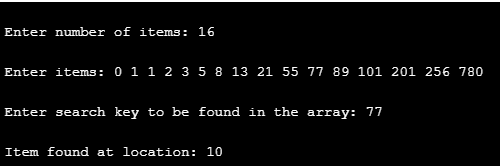What is Jump Search Algorithm?
Like Binary Search, Jump Search is a scanning calculation for arranged clusters. The fundamental thought is to check fewer components (than direct hunt) by hopping ahead by fixed advances or skirting a few components instead of looking through all components.
For instance, assume we have an array arr[] of size n and square (to be hopped) size m. At that point we search at the records arr[0], arr[m], arr[2m]… ..arr[km], etc. When we discover the stretch (arr[km] < x < arr[(k+1)m]), we play out a straight pursuit activity from the file km to discover the component x.
How about we think about the accompanying array: (0, 1, 1, 2, 3, 5, 8, 13, 21, 34, 55, 89, 144, 233, 377, 610). Length of the cluster is 16. Bounce search will discover the estimation of 55 with the accompanying advances expecting that the square size to be hopped is 4.
- Stage 1: Go from index 0 to index 4
- Stage 2: Go from index 4 to index 8
- Stage 3: Go from index 8 to index 12
- Stage 4: Since the component at a record 12 is more prominent than 55 we will bounce back a stage to come to list 8
- Stage 5: Perform straight pursuit from list 8 to get the component 55.
What is the ideal square size to be skipped?
In the most pessimistic scenario, we need to do n/m hops and if the last checked worth is more prominent than the component to be looked for, we perform m-1 correlations more for straight hunt. In this way the absolute number of examinations in the most pessimistic scenario will be ((n/m) + m-1). The estimation of the capacity ((n/m) + m-1) will be least when m = √n. In this manner, the best advance size is m = √n.
Implementation of Jump Search Algorithm:
In this program we have implemented the Jump search algorithm in C++ language:
#include<iostream>
#include<cmath>
using namespace std;
int jumpSearch(int a[], int n, int item) {
int i = 0;
int m = sqrt(n); //initialise the block size= √(n)
while(a[m] <= item && m < n) { // the control will continue to jump the blocks i = m; // shift the block m += sqrt(n); if(m > n – 1) // if m exceeds the array size
return -1;
}
for(int x = i; x<m; x++) { //linear search in current block
if(a[x] == item)
return x; //position of element being searched
}
return -1;
}
int main() {
int n, item, loc;
cout << “\n Enter number of items: “; cin >> n;
int arr[n]; //creating an array of size n
cout << “\n Enter items: “;
for(int i = 0; i< n; i++) { cin >> arr[i];
}
cout << “\n Enter search key to be found in the array: “; cin >> item;
loc = jumpSearch(arr, n, item);
if(loc>=0)
cout << “\n Item found at location: ” << loc;
else
cout << “\n Item is not found in the list.”;
}
The input array is the same as that we have used in the example:

Note: The calculation can be actualised in any programming language according to the necessity.
Must Read, binary search algorithm





